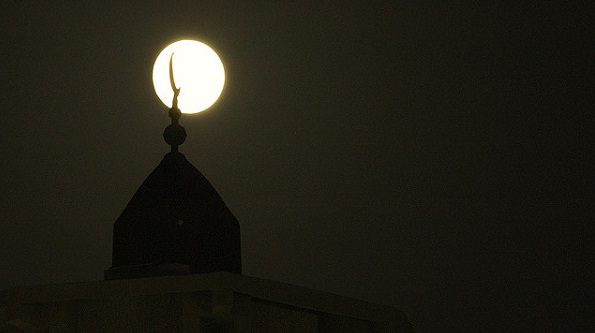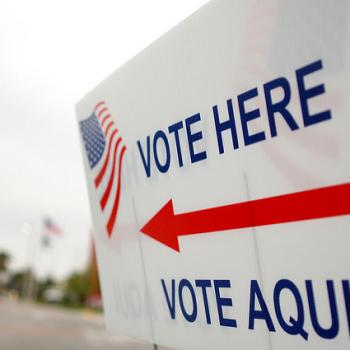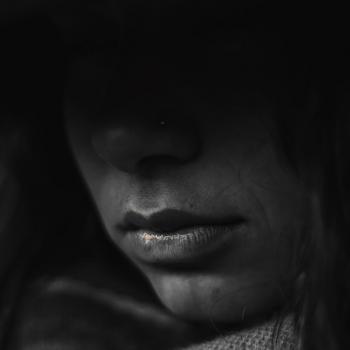
This is Day 27 of Altmuslim’s #30Days30Writers series for Ramadan 2015.
By Zainab Chaudary
“We choose to go to the moon in this decade and do the other things, not because they are easy, but because they are hard.” — President John F. Kennedy, Jr. (Address at Rice University, September 12 1962)
My first memory of a mosque is of a forest: I am four years old, playing hide-and-seek with the others kids in the maze of rooms where Sunday school classes are held and end up running straight into the large prayer room. I see rows and rows of brightly clad legs in straight lines and sense the quiet, even as it is punctuated by a melodious, hypnotic voice, rising and falling in a language I don’t understand.
For the briefest of moments, I feel like Little Red Riding Hood in her woods as I wander between the lines, looking up at solemn faces when suddenly, all my trees fall simultaneously, felled by that giant voice coming from the front of the room.
It is a sweet memory. As an adult, I know that I was blessed with the community I grew up in. It’s more than 40 years old now and has expanded into a force of nature. Unlike so many Muslims — many of them women — I never felt unmosqued growing up. There has never been a barrier between the men and the women at my mosque, nor inequality between the sexes.
Women have sat on the board for years and many have served as presidents. The congregation is fairly diverse, and the community politically, civically, and socially active.
But I know it must have had its growing pains. I know, because while I still live about 20 minutes away from the mosque I grew up with, I also live 20 minutes away from the musallah of a new mosque, one that is in its nascent stages. I know that they are struggling for space and jockeying for town zoning approvals; I know that while my mother is on the board, some women in this community are still fighting for their place while others are content to stay meekly on the sidelines; I know that there is petty in-fighting, a streak of conservatism, and an occasional lack of diversity as well as of truly intellectual discourse.
We rent space for taraweeh — at a bingo hall and occasionally a church — and this community prefers Chinese-style screens between the men’s prayer area and the women’s. The community frustrates me, the situation exasperates me. And yet, I still attend prayers as part of this mosque rather than the other that I grew up in.
Why do I do it? Every year during Ramadan, I learn a little more about myself. Last year — with the emotional toll of world events, personal grief and longer fasts converging upon a sweltering, claustrophobic July — I learned that though I am sometimes moved by the injustices of the world to be angry at God, my faith in His existence never wavers. I learned that even in my anger, I recognize that there is someone to be angry at.
This year, that faith goes a step further: I realize that while I outwardly try to be jaded or cynical about the world (or at a bare minimum, realistic), I possess a near infallible hope. It’s not optimism mind you — I can be as misanthropic as the next person — but merely the unshakeable idea that things can be better, the ability to envision what life can look like on the other side.
It’s what has helped me survive a great many things: Career challenges, a move to a completely foreign country, geographic distance from friends, conflicted feelings of belonging and identity and the loss of a sibling. In that survival, a definition of who I am as a person has formed, like wet clay molded into pottery.
On the one hand there’s the easy mosque, the one where I have to do no work, the one where I can occasionally contribute something useful, but where things are mostly established. On the other is the prickly, difficult, maddeningly frustrating mosque, the one that needs the work, the one that requires effort, the one that must be shaped and directed and requires dissenting voices for its own forest to grow.
In these two mosques, I see mirrored the struggles of the American-Muslim community today: There are easy debates, the things we can all rally around — combatting Islamophobia, improving our image, using positive stories and love to counteract hate and ugly rhetoric. But there are also the complex issues that divide us: Countering Violence Extremism programs, the Muslim Leadership Initiative debate, our struggles with racism within the ummah. I know that growth requires dissenting voices, that change needs a variety of ideas and conversations coupled with a basic respect for one another’s opinions.
Maybe I’ve got a masochistic streak, maybe I have an idiotic need to surmount a good challenge, but I know I much prefer the hard work to the easy life. I’ll keep my hope too, thanks very much. After all, to smell the roses, you’ve got to put up with a few thorns once in a while …
Zainab Chaudary works in PR and advocacy communications by day, and is a writer and geek by night. Her blog, The Memorist, ruminates upon travel, religion, science, relationships, and the past, present and future experiences that make up a life. She tweets @TheMemorist











